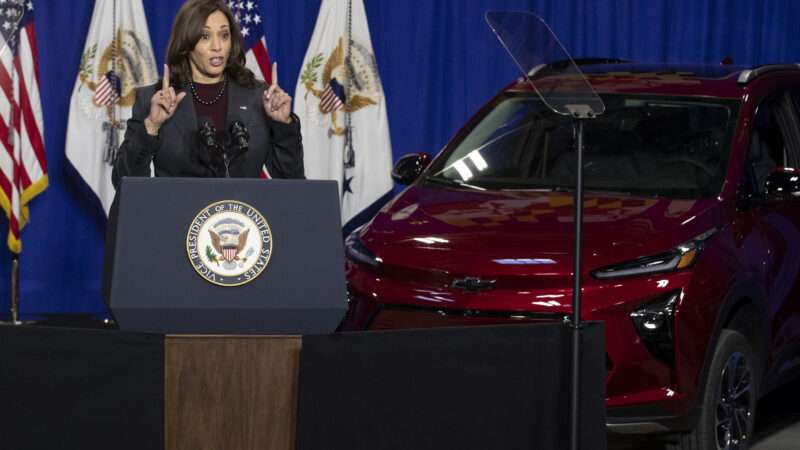
Since entering the race as the designated Democratic candidate for president, Vice President Kamala Harris has seemingly walked back some of her previous positions. In the latest example, Harris has apparently abandoned support for federal rules that would mandate the production of electric vehicles (E.V.s).
"In a lengthy 'fact-check' email last week that covered several issues, a campaign spokesperson included a line saying that Harris 'does not support an electric vehicle mandate,'" report Alex Thompson and Ben Geman of Axios, "suggesting she changed her previous position, without elaborating."
As a U.S. senator, Harris co-sponsored the Zero-Emission Vehicles Act of 2019, establishing "a schedule for increasing the percentage of zero-emission vehicles a vehicle manufacturer delivers for sale," phasing out all other vehicles by 2040.
While the bill never passed, Harris doubled down on the proposal when she ran for president in 2019, pledging to implement federal rules that would require half of all new vehicles sold by 2030 to be zero-emission, increasing to 100 percent by 2035.
But when asked by Axios "whether she would sign or veto a bill" like the ones she previously supported, Harris' campaign "declined to comment."
This suggests that Harris is not only backing away from a position that she had previously supported, but one that President Joe Biden's administration put forward in new rules from the Environmental Protection Agency (EPA) earlier this year.
Some suggest that Harris' reasoning is nakedly political. "Vice President Harris is lying about her supposed opposition to an EV mandate," Sen. Pete Ricketts (R–Neb.) said in a statement. "This sudden reversal just months before the election is a pathetic and transparent attempt to distance herself from the unpopular EV mandates already being pushed by the Biden-Harris EPA."
In fairness, Harris' reasoning probably is less ideological than political: Polling conducted by the American Fuel & Petrochemical Manufacturers, an oil industry trade group, indicates that most Americans—including a majority of Republicans and independents and a plurality of Democrats—oppose bans on gas-powered cars. The poll further found that majorities in eight battleground states oppose the bans by healthy margins, including Arizona, Michigan, Ohio, Pennsylvania, and Wisconsin—most or all of which Harris must win to become president.
While a group representing the oil industry is hardly a neutral party, Pew Research Center found similar results in a poll conducted last year, in which 59 percent of Americans indicated that they opposed phasing out gas-burning cars.
Americans are also speaking with their dollars, as demand for fully electric vehicles has cooled in recent months. Automakers, recognizing this downturn, are reinvesting in hybrids, which they see as more palatable to drivers who may not be ready to swear off internal combustion engines altogether.
"Many of our hybrids in the U.S. are now more profitable than their non-hybrid equivalent," Ford Motor Co. CEO Jim Farley said in May. "We should stop talking about it as transitional technology."
Hopefully Harris' about-face is sincere. Market demand indicates that Americans are not yet ready to embrace fully electric vehicles as their only option. Until they are, the industry should be free to use whatever technologies it can to most effectively move toward the goal of fewer carbon emissions.
The post Kamala Harris Is Right To Back Away From an Electric Vehicle Mandate appeared first on Reason.com.







